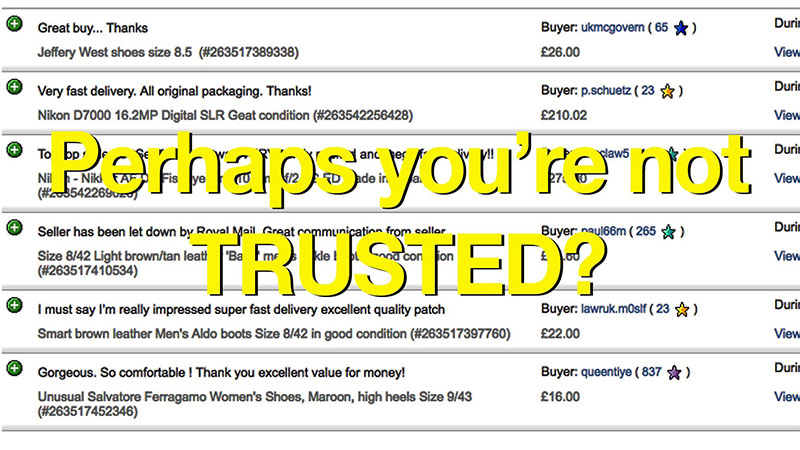If your potential customers don’t trust your company, you’re going to have a hard time winning new business, and that’s as true for online retailers as it is for businesses not directly selling via their website.
Prospects need reassurance that your business can deliver, and they’ll scrutinise your business online, long before they’ll pick up the phone or write an email to you, so they need reassurance that you can deliver what you say you can. It’s not just about working hard to build a good reputation; you have to provide hard evidence of that reputation.
The online marketplace eBay is a prime example of how to build a reputation and use it to reassure customers that you’re a reliable person to buy from – you probably wouldn’t buy from someone who had lots of negative reviews after all. And it’s not just businesses that sell products that should bear this in mind. Service-based businesses are equally, if not more, dependent on this vital currency of trust.
And while eBay might seem a long way away from your business, just go with me for a moment and think: would you spend £275.00 on a second-hand camera lens with someone you know nothing about? You’ll be sending the money before you get the lens too! Have a look at my eBay reputation, bellow, as a seller and make your own judgement.

In the sometimes grubby world of eBay, reputation is key and like many people, I’ll not deal with someone who does not have at least 10 transactions behind them.
‘Who steals my purse steals trash’
It’s clear that businesses need to reassure their customers what they do, where they add value and that they are credible. Before trust is established, it’s important to consider exactly why it is so important; not just for businesses selling to a buyer, but why it matters to us humans generally.
Reputation is a slippery fish. Invaluable to the starving man and near impossible to get a firm hold of. It’s one of those universal human qualities that is difficult to measure yet informs the way we relate to, and interact with each other. As Shakespeare’s infamous villain Iago put it, money can be stolen, it comes and it goes. Reputation is something infinitely more valuable and harder to acquire: ‘But he that filches from me my good name. Robs me of that which not enriches him. And makes me poor indeed.’
Reputation also governs how commerce works, as is evident in any of the two billion transactions that occur through eBay every day. A good reputation equates to trustworthiness, and the condition of being trustworthy equates to customers spending their money with you.
Hard-won and easily lost, reputation, and subsequently trust is the ultimate currency for businesses. Without it, you’re going nowhere fast – especially online, where customers can pull up a plethora of information about you at the click of a button.
“But we don’t do business online”
The reality is that few reading this blog trade online. But think for a minute: where will your potential new clients scrutinise you and your business first, before they call you or write an email to you? Yes, that’s right, they’ll look at your website, look at your people, look at any video testimonials, check out the directors on LinkedIn. And every one of those avenues is online. And each is an opportunity for you and your business to stumble.
What does trust look like?
For businesses trying to build trust online, there are some things to think about which will help to bolster your reputation.
Being based where you say you are: Try looking up your business on Google – What little picture does Google show in the search results? Is it a just a house on a residential street?
Who works for your business and how big is it? Often companies feel the need to be bigger than they are, yet so often it goes wrong and gives the wrong impression. Be honest – it’s the best way.
A real person: There’s nothing more disheartening than an absence of real people on a website. And that’s especially important if you provide a professional service. The stats say that if you have a ‘meet the team’ heading in your top navigation on your website, 37% of your traffic will have a look there. Customers want to know who they are dealing with and putting a face to the company name lends your business that all-important humanity. And if your business is large enough that it’s simply not practical to include everyone on the site, then make some concessions: feature the directors, star employees, even including a little company history is better than nothing. No people on a website plants seeds of doubt about how trustworthy a company is: what exactly are you hiding?
Provide lots of information: If you are selling things online, customers want detail. They can’t physically touch the item or see it in person so they rely on accurate descriptions, detailed specifications and images. Providing that little bit more detail, such as a selection of photos from different angles instead of just one. increases the customer’s faith in you and helps you to win the sale.
More than pretty pictures!: Web designers love pretty pictures! Yet so often irrelevant imagery gets in the way of a strong message. And if you can’t cleverly articulate what you do and where your business adds value, you’ll not be building your reputation either. Have a look at my blog about ‘Personality’, and then look at your website. And consider my challenge to look at the imagery on your home page and ask yourself what function it really performs, and then look at your messaging and ponder: does it really entice the website visitor?
Exhibit A, Your Honour
After delivering on what you promise to deliver, the evidence is perhaps the single most important factor to building trust. Show, don’t tell. It’s not about you saying how great your product or service is, it’s about people making up their own mind about you. Reviews are a fantastic way to do this, testimonials and star ratings are equally viable. On e-commerce platforms such as eBay, the whole buying and selling principle is based on reputation. They say that your customers are your best salespeople and if prospects can come to your site and see that other people have been satisfied by what you provide, they’ll feel happier to part with their cash.
Services require even more reassurance
eBay reviews are a handy way to demonstrate why reputation matters in business, but it’s not just applicable if you’re selling widgets. It’s even more important if you’re selling a service. Put yourself in the customer’s shoes: they’re buying something that is intangible, they can’t try it on for size, when they place the order they’ve got to put a lot of trust in the supplier and take a big leap of faith. So what can you do to maximise trust? Include testimonials on your website or on social media. Video testimonials are especially powerful, as hearing directly from the horse’s mouth about a good experience can be very reassuring. While the customer will be looking for different information than if they were buying a product, they still want to know the most important thing of all: what’s in it for them? For instance:
• What did clients like about your service? Was it friendly, did you go above and beyond, are you offering something that nobody else does?
• What did participants get out of your course? Has it changed their outlook? Are they healthier, happier, or better off financially?
• What pressures does your maintenance contract take off your clients? Does it save them money in the long run, or time, or hassle?
The bottom line
If you don’t take care of your online reputation, your business will suffer. Whether or not you trade online, whether you sell widgets or a bespoke service, reputation and the level of trust that ensues is a deal breaker for customers.
Shakespeare and eBay are unlikely bedfellows yet demonstrate that reputation and business are wholly united. Without a good reputation there’s no reassurance to customers, and without reassurance, there’s no trust and certainly no sales.
If you’d like to know more, or you’re interested in receiving some constructive criticism about your online image and reputation, then why not get in touch, I’d be happy to have a conversation with you.


